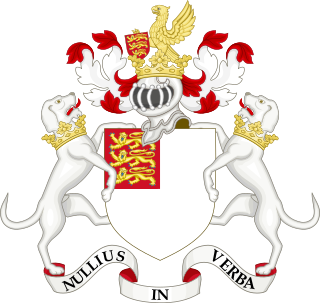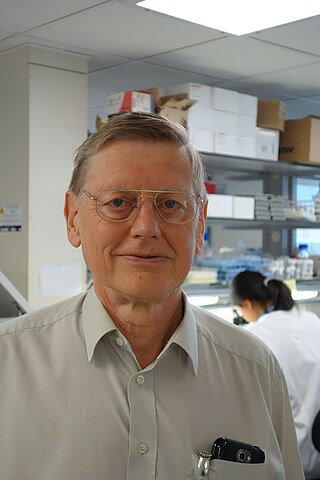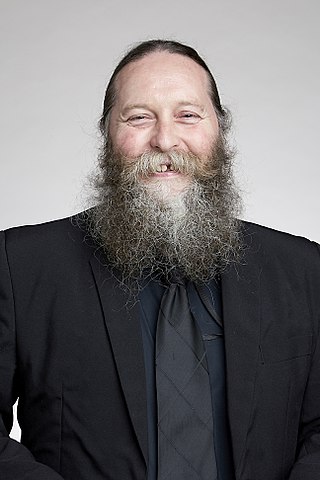Related Research Articles

The Royal Society for the Encouragement of Arts, Manufactures and Commerce (RSA), commonly known as the Royal Society of Arts, is a London-based organisation committed to finding practical solutions to social challenges.
The Linnean Society of London is a learned society dedicated to the study and dissemination of information concerning natural history, evolution, and taxonomy. It possesses several important biological specimen, manuscript and literature collections, and publishes academic journals and books on plant and animal biology. The society also awards a number of prestigious medals and prizes.
A fellow is a concept whose exact meaning depends on context. In learned or professional societies, it refers to a privileged member who is specially elected in recognition of their work and achievements. Within the context of higher educational institutions, a fellow can be a member of a highly ranked group of teachers at a particular college or university or a member of the governing body in some universities; it can also be a specially selected postgraduate student who has been appointed to a post granting a stipend, research facilities and other privileges for a fixed period in order to undertake some advanced study or research, often in return for teaching services. In the context of research and development-intensive large companies or corporations, the title "fellow" is sometimes given to a small number of senior scientists and engineers. In the context of medical education in North America, a fellow is a physician who is undergoing a supervised, sub-specialty medical training (fellowship) after having completed a specialty training program (residency).

The Royal Society, formally The Royal Society of London for Improving Natural Knowledge, is a learned society and the United Kingdom's national academy of sciences. The society fulfils a number of roles: promoting science and its benefits, recognising excellence in science, supporting outstanding science, providing scientific advice for policy, education and public engagement and fostering international and global co-operation. Founded on 28 November 1660, it was granted a royal charter by King Charles II as The Royal Society and is the oldest continuously existing scientific academy in the world.

Fellowship of the Royal Society is an award granted by the Fellows of the Royal Society of London to individuals who have made a "substantial contribution to the improvement of natural knowledge, including mathematics, engineering science, and medical science".

Fellowship of the Royal Society of Edinburgh (FRSE) is an award granted to individuals that the Royal Society of Edinburgh, Scotland's national academy of science and letters, judged to be "eminently distinguished in their subject". This society received a royal charter in 1783, allowing for its expansion.

John Roger Speakman is a British biologist working at the University of Aberdeen, Institute of Biological and Environmental Sciences, for which he was Director from 2007 to 2011. He leads the University's Energetics Research Group, which is one of the world's leading groups using doubly labeled water (DLW) to investigate energy expenditure and balance in animals. Between 2011-2020, he was a '1000 talents' Professor at the Institute of Genetics and Developmental Biology, Chinese Academy of Sciences, in Beijing, China, where he ran the molecular energetics group. In 2020 he moved to the Shenzhen Institutes of Advanced Technology, Chinese Academy of Sciences in Shenzhen, China where he works at the Center for Energy Metabolism and Reproduction and Head of the Shenzhen Key laboratory of Metabolic Health.
Loren H. Rieseberg is a Canadian-American botanist.

Jonathan Felix Ashmore is a British physicist and Bernard Katz Professor of Biophysics at University College London.
Sir James Baddiley FRS FRSE was a British biochemist.

Claudio Daniel Stern FRSB, FMedSci, FRS is a Uruguayan biologist currently working at University College London (UCL).

James Henderson Naismith is Professor of Structural Biology at the University of Oxford, former Director of the Research Complex at Harwell and Director of the Rosalind Franklin Institute. He previously served as Bishop Wardlaw Professor of Chemical Biology at the University of St Andrews. He was a member of Council of the Royal Society (2021-2022). He is currently the Vice-Chair of Council of the European X-ray Free Electron Laser and Vice-President (non-clinical) of The Academy of Medical Sciences. It has been announced that he will be the Head of the MPLS division at Oxford in the autumn of 2023.

Sir Stephen Robert Bloom FRS is a British Professor of Medicine at Imperial College London where he leads the Diabetes, Endocrinology and Metabolism division.

Neil Andrew Robert Gow is a professor of Microbiology and deputy Vice Chancellor at the University of Exeter. Previously he served at the University of Aberdeen for 38 years and retains an honorary chair there.

Nigel Shaun Scrutton is a British biochemist and biotechnology innovator known for his work on enzyme catalysis, biophysics and synthetic biology. He is Director of the UK Future Biomanufacturing Research Hub, Director of the Fine and Speciality Chemicals Synthetic Biology Research Centre (SYNBIOCHEM), and Co-founder, Director and Chief Scientific Officer of the 'fuels-from-biology' company C3 Biotechnologies Ltd. He is Professor of Enzymology and Biophysical Chemistry in the Department of Chemistry at the University of Manchester. He is former Director of the Manchester Institute of Biotechnology (MIB).

Anne Jacqueline Ridley is professor of Cell Biology and Head of School for Cellular and Molecular Medicine at the University of Bristol. She was previously a professor at King's College London.

Pete Smith is Professor of Soils and Global change at the University of Aberdeen where he directs the Scottish Climate Change Centre of Expertise, ClimateXChange.
Susan RosserFRSB FLSW is a professor of Synthetic Biology at the University of Edinburgh.

Neil Alexander Steven Brockdorff is a Wellcome Trust Principal Research Fellow and professor in the department of biochemistry at the University of Oxford. Brockdorff's research investigates gene and genome regulation in mammalian development. His interests are in the molecular basis of X-inactivation, the process that evolved in mammals to equalise X chromosome gene expression levels in XX females relative to XY males.

Geoffrey Michael Gadd is a British-Irish microbiologist and mycologist specializing in geomicrobiology, geomycology, and bioremediation. He is currently a professor at the University of Dundee, holding the Boyd Baxter Chair of Biology, and is head of the Geomicrobiology Group.
References
- 1 2 Website developed by James Hamlin (6 February 2014). "Fellowship (FRSB)". Rsb.org.uk. Retrieved 16 December 2016.